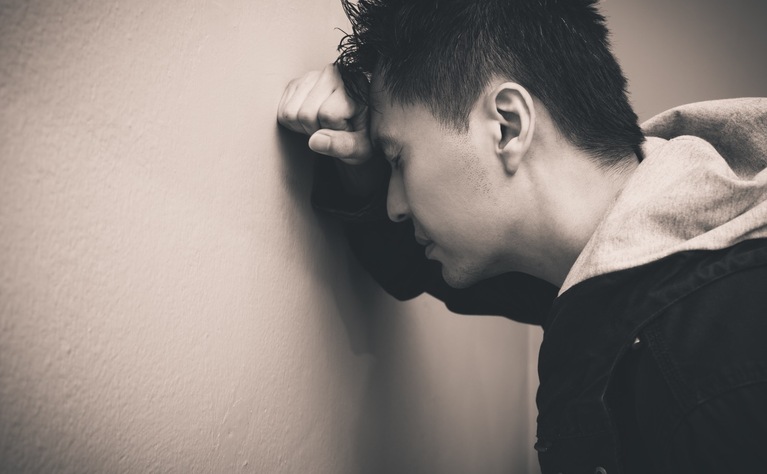
I’ve lost count of the amount of times I’ve soiled myself in public in the past eight years. It’s degrading, humiliating and not something I can talk to many people about.
But I’m also lucky that the people I can talk to understand. They support me, help clean me up and get me back out into the world with my head held high.
In 2008 I was diagnosed with the chronic condition ulcerative colitis (UC). To look at me you wouldn’t know. I’ve just turned 30, I go running, eat healthily, own my own business, live in a nice house in a nice area, am happily married and have a gorgeous little boy.
But, every day for me is a struggle. Mentally, physically, emotionally.
An invisible illness
My UC causes my colon to become severely ulcerated and inflamed. It bleeds and causes me to need the toilet urgently, really urgently; and when I need to go there’s nothing I can do about it. My immune system is attacking my body. I’m exhausted, my joints ache, my mouth is full of ulcers and I get ill a lot.
But, to the rest of the world I look fine - so I must be, right?
There are millions and millions of people like me across the globe - either with UC, Crohn’s disease (which like UC is an inflammatory bowel disease (IBD)) or another chronic condition. And. It’s. Hard. Really hard.
Dark places
I come across people daily who have IBD and are in a very dark place. In the past few months I’ve seen a dozen or so stories in forums of people who’ve tried to harm or kill themselves because of their Crohn’s disease or ulcerative colitis. I know of teenagers who have taken their own lives because of it.
These are people who are just like me. They are in my IBD community - my friends - and we all rely on each other for support but we are all also fighting our own personal battles. We aren’t trained to deal with our own feelings, let alone take on the feelings of others too. And, our families aren’t trained to deal with the fall out either.
However, we try - often with great success - to support each other through the darkest of times, not just because we have to but because we want to. Sometimes though we drop the ball - and the consequences of that can be devastating.
Where is the support coming from?
We need help. Professional mental health help. But it’s not forthcoming. Sadly the psychological struggles for people with IBD aren’t widely recognised or supported.
Effect of mental health on IBD
The truth is that the way we think and feel probably plays a huge part in our disease. Personally, when I’m not feeling in a good place in my mind or I’m struggling to control work stress or I’m constantly anxious because I think I’m going to poo myself in public it makes my UC worse. For me there is a direct cause and effect. If I have my mental struggles under control I feel in a better place to deal with my physical ones. And, if I didn’t have IBD I probably wouldn’t have these feelings at all.
Mental health issues in people with IBD need to be treated as part of the disease by people within the IBD clinic setting, not a stand alone counsellor the patient has to pay privately to see - and it needs to be taken more seriously.
I’m not naive and I understand there are serious funding pressures for the NHS right now. I’ve talked to NHS IBD teams who do want to integrate a psychologist into their clinic but when they apply for funding they are getting knocked back. They have to prove there is a need for the service (and also that it is cost effective).
There certainly is a need, but the true scale of the need is not known. Our doctors aren’t asking the right questions and too many of us aren’t speaking up about how our disease really makes us feel (and tackling the problem head-on in the early stages of someone’s disease would probably save the NHS many times over the cost of a psychologist’s wage).
How can we help?
So how can we, the IBD community, help? It needs to start with us making our voices heard. We need to not be afraid of talking with our consultants about how our IBD makes us feel. If they aren’t going to ask the questions then we need to volunteer the information to them. And, we need to demand support. Only then can a true picture of the problem start to be drawn.
In the meantime I will continue to support my IBD friends as best I can - and I know they will do the same for me.

